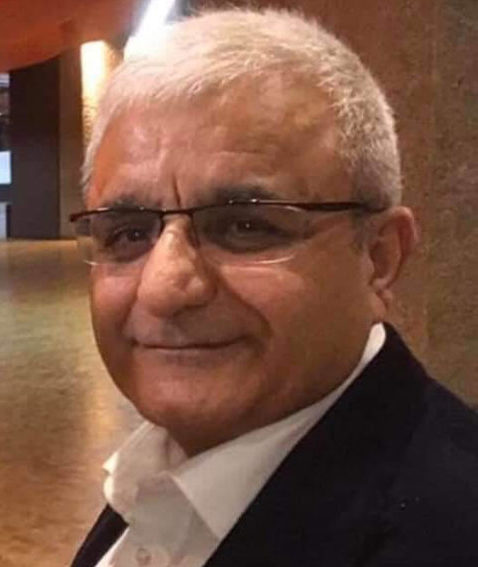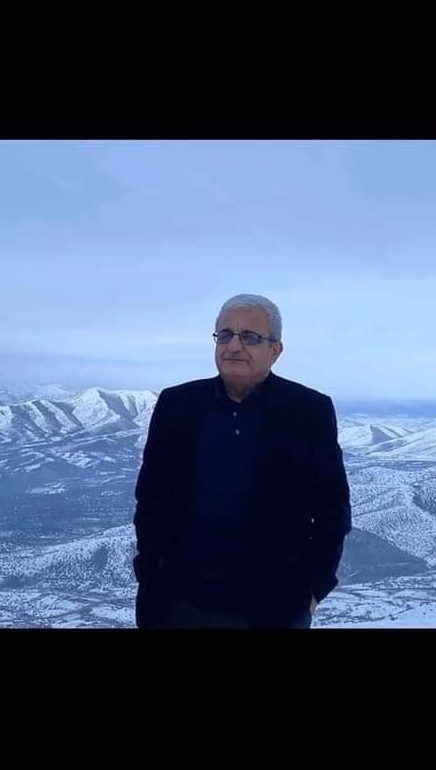By Friends of Kamaran:
Kamaran Said Majeed, who died of Coronavirus complications on 9th April, was a Kurdish activist, humanist and dedicated family man. He held British citizenship, but he remained at heart a Kurd, through and through.
He was born to a large family of 9 in 1959, in Sulemani (officially called Al-Sulaymaniyah) in the Kurdish-populated northwestern part of Iraq. In addition to his older sister, he was the 5th of 6 brothers. He was born one year after the July 1958 coup that overthrew the monarchy in Iraq and began a series of alternating short-lived governments that succeeded each other in bloody coup d’états until 1968, when the Ba’ath party took over and remain in power until their forcible removal by the allied forces in 2003.
Kamaran’s was a Kurdish patriotic family that was firmly engaged in the Kurdish movement until the collapse of 1975, which saw the iron hand of the Ba’ath regime reaching Sulaimani for the first time since 1963, when they committed the 9th June massacre.
Still a teenager and a student in the Industrial Preparatory School (finished in 1979), Kamaran saw himself actively involved in the resistance movement that was burgeoning in the underground cells in the city and quickly spilled over to the rural areas, harnessing the first groups of Kurdistan Peshmarga Forces. His elder brother, Dler Said Majeed, a trusted aid to the late President Jalal Talabani and currently serving as a member of the Patriotic Union of Kurdistan Leadership Committee, was one of the first waves who joined those groups.
During those dark days that converted the city of Sulaimani into a large prison, Kamaran and his comrade often defied the curfews, braving the Amn (Iraqi security forces) that patrolled the streets to spray patriotic slogans on the walls in order to uplift the people’s morale and maintain their fighting spirit in the face of the Ba’ath regime’s repressive onslaughts.
Indeed, not only Kamaran, the whole of his family were recruited in that cause, turning theirs’ into a safe house for the underground movement and the Peshmargas. Remembering his comrade and friend in those days, Ata Mufty stated “not only those members of the underground movements activists who needed to evade the Amn hid in their house, but also some of the Peshmarga slipping from the rural areas to the city would billet for a while in their house too”. Mufty added, “many of the publications that were sent from the leadership headquarters would be received by Jaza, his other brother, and then we’d distribute it in the city with him and others”.
In April 1982, a small demonstration in the town of Qaladiza started a wave of unrest in many Kurdish cities and towns that were organised and directed by the underground cells. These events, which were later dubbed the Kurdish Intifada, were eventually suppressed by the Amn apparatus, who later began a wave of mass arrests in the cities to punish the activists behind it.
To preempt the growing danger of arrest, Kamaran decided to join the Peshmargas, following the footsteps of his other elder brother, Adham, who had joined them two years before. According to Mr. Jawas Saeed, one of his comrades in arms, he served for a period with Mala Bakhtyar at the 1st Centre, then he joined the 2nd Centre that was operating in Jafaty valley, in the west of Sulemani, for the remainder of his years as a Peshmarga .
The end of the Iraq-Iran war in March 1988 freed the Iraqi army’s hand and heralded a period of vicious and systematic attacks on the Kurds, culminating in the illegal use of chemical weapons, starting in the Jafaty valley in February and Halabjah in March of that year. The attacks were part of a series of 11 campaigns, known as the Anfal Campaigns.
Kamran was in Bargaloo, one of the villages that were targeted in the campaign in April of the same year. His niece, Soma Adham, lamenting the passing of her uncle recently, wrote on her Facebook pages “you were protecting me from the chemical attacks and shelling. Who will protect me from this hell now?”
Kamran and a handful of Peshmargas remained in the Jafaty valley, defying the imminent risk of another chemical attack until 1990. Eventually, Kamaran, Mr. Saeed and others left the area of Qasma Rash on the border with Iran in July 1990 and made their way to London by 2nd October 1990. However, his arrival and settlement in London did not last for long. As Saddam’s defeated army retreated from Kuwait, they turned their guns on the Iraqi people to suppress their short-lived uprising in March 1991. In Kurdistan, however, fearing another chemical attack, the people fled the cities and turned to the mountain and streamed across the border to neighbouring Iran and Turkey. The footage of the fleeing children and women shook the conscience of the world, but sent thousands from the Kurdish diaspora onto the streets of Europe and the USA in protest.
Kamaran found himself, once again, in the midst of a struggle to defend the Kurdish nation. He took part in every demonstration, every picket and meeting, that was aiming to attract attention to the plight of the fleeing Kurds on the mountains. He was one of the few who planned and executed a daring yet successful operation to occupy the building of the Iraqi Embassy in London. He was one of the few arrested for the act who stood trial and were let off with token fines.
Kamaran continued his activities in London throughout the 1990s until 2003, when Saddam’s regime was forcibly overthrown by the allied forces. It was a travesty of coincidences that he passed away on the 17th anniversary of that monumental day.
Kamaran did not confine his activities to supporting the Kurds from Southern Kurdistan. He reached out to other communities and supported the struggle of the Kurdish people in Northern Kurdistan, attending almost every demonstration condemning the aggressive policies of the Turkish state. He also worked hard in support of the Kurds in Rojava, especially when they heroically faced the forces of darkness that were embodied in the ISIS attacks on Kobani and later the Turkish incursions in Afrin and elsewhere. During that period Kamaran dedicated almost all of his time to the fight.
He is survived by his wife, Alwan Omar, his 24 years old daughter Aran, and 19 years old son, Arez.
.jpg)




